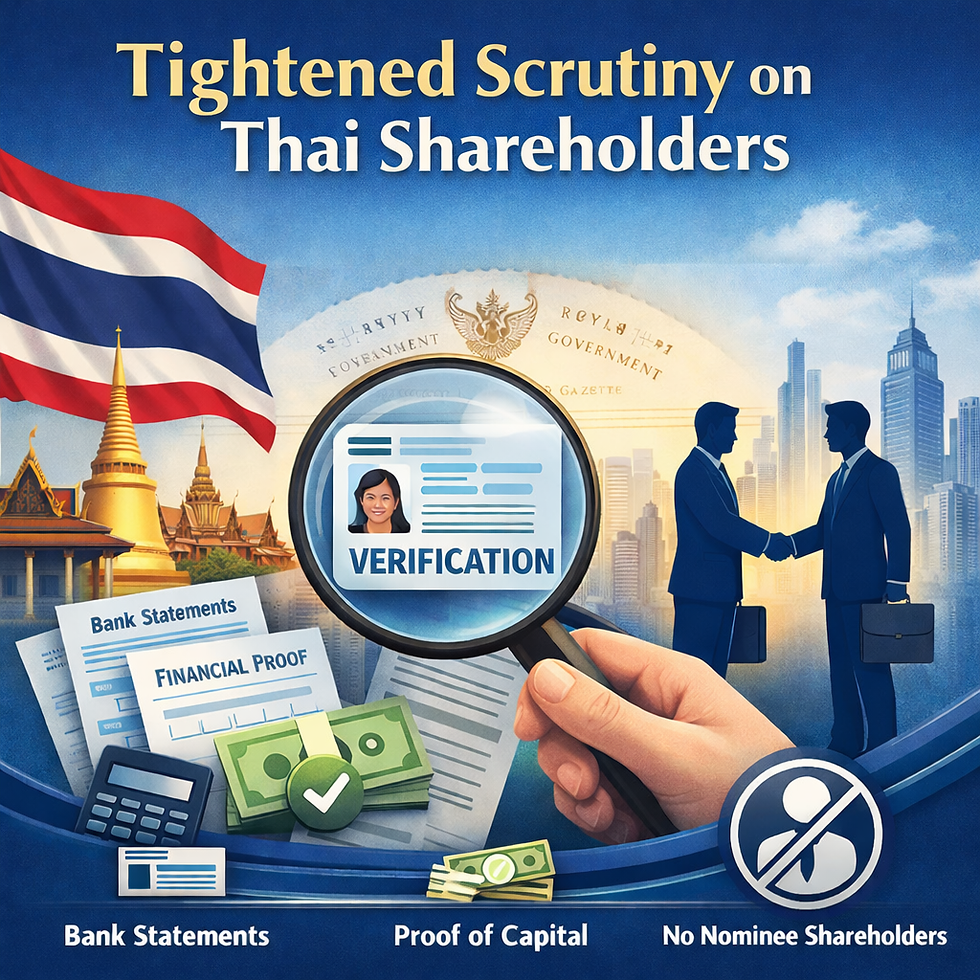What You Should Know When Filing Civil Lawsuit in Thailand 在泰國提起民事訴訟須知事項
- 2023年1月31日
- 讀畢需時 3 分鐘
In our daily life, it is inevitably to face civil disputes such as contract disputes, distribution of inheritance, and unjust enrichment. When deciding to file a civil lawsuit, it’s important to know basic procedure.
我們的日常生活中不可避免發生民事糾紛,像是合約爭議、財產分配、或是不當得利。當決定要提起民事訴訟時,了解基本程序是件非常重要的事。
Following is basic introduction of civil lawsuit:
以下為民事訴訟基本介紹:
1. Determine the right Court to file a lawsuit
確定要向正確的法院起訴
First is to decide whether to start the case at Kwaeng Court or Provincial Court. In our earlier article “Introduction of Different Types of Courts in Thailand” (https://0rz.tw/Yckqd), we have introduced the function of Kwaeng Court and other courts which handle specific kind of civil cases.
首先要決定向地方法院或是省級法院開始訴訟。在我們先前的文章 ”泰國法院介紹” (https://0rz.tw/Yckqd) 有介紹過地方法院以及其他專門處理特定民事案件的法院的功能。
On the other hand, Kwaeng Court is in charges of civil cases that:
另一方面,省級法院處理以下民事案件:
- The amount is more than 300,000 baht;
涉及金額超過30萬泰銖;
- The case isn’t related to money, which the claimant request to cease the disturbance, annoyance or damage;
案件與金錢無關,原告要求停止騷擾、妨礙或損害;
- It’s a non-contentious case, such as requesting court order to determine the incapacitated of a person.
為非訴訟案件,例如請求法院命令確定一個人無行為能力。
In case in a province where there is no Kwaeng Court, the Provincial Court will take the role of Kwaeng Court.
如果一個省沒有地方法院,省級法院會扮演地方法院的腳色。
In addition, normally a lawsuit should be filed to Court within the province where the defendant resides or the place where the dispute happens. It also determines whether there’s an agreement which indicate where to file a lawsuit when there is a dispute. For further information, please check Thai Civil Procedure Code, Section 4(1).
此外,通常案件會在被告所在、或是爭議發生的省提起訴訟。另外,有無合約規定爭議發生時的起訴法院也會決定起訴的地點。如需進一步資訊,請參考《泰國民事訴訟法第 4(1) 條》。
2. Preparing relevant documents
準備相關文件
- Complaint and relevant supporting evidence;
訴狀及相關證據資料;
- Power of Attorney: in case you appoint a lawyer(s);
委託書:如有委任律師;
- Official documents of personal information of defendant(s);
有關被告個人資訊的官方文件;
- Affidavit.
宣誓書。
3. Paying relevant fees
支付相關費用
The relevant fees should be paid include:
有關的費用包含:
- Court fees, which are fees charge by court, being paid when starting a lawsuit or filing an appeal. The court fees for monetary and non-monetary cases are different. There are also some fees required under Thai Civil Procedure Code.
向法院支付的法庭費用,在起訴或上訴的時候支付。金錢及非金額案件的法庭費用不同,《泰國民事訴訟法》也規定其他相關法庭費用。
- Other court fees in civil cases
其他法庭費用
For example, fee for certification requesting judgment or its order shall be 50 baht.
舉例來說,確定判決或命令的核實費為 50泰銖。
- Other expenses: such as witness fees, travel expenses, and appraisal cost.
其他支出:像是證人費、差旅費、以及鑑定費。
According to Section 149 under Thai Civil Procedure Code, if a plaintiff or a defendant is not able to pay its court fees, they may file an application by motion to exempt such fees.
根據泰國民事訴訟法第 149 條,如果原告或被告無法分擔法庭費用,他們可以通過動議提交申請,免除此類費用。
4. General procedure once the documents are submitted
案件提交後的通常程序
Please refer to our earlier article “General Procedure of Thai Civil Lawsuit” at https://0rz.tw/UT4w9
請參考我們之前的文章”泰國民事訴訟一般程序” https://0rz.tw/UT4w9




留言